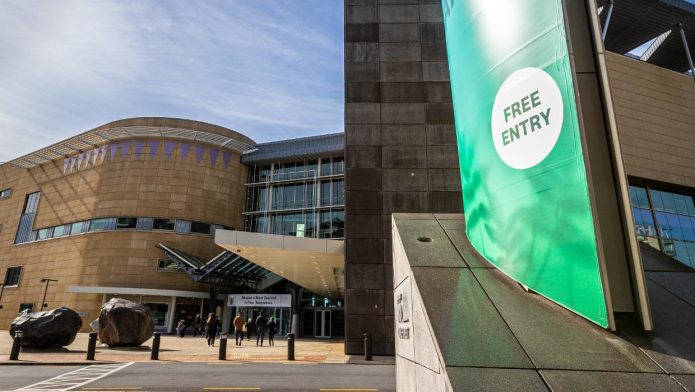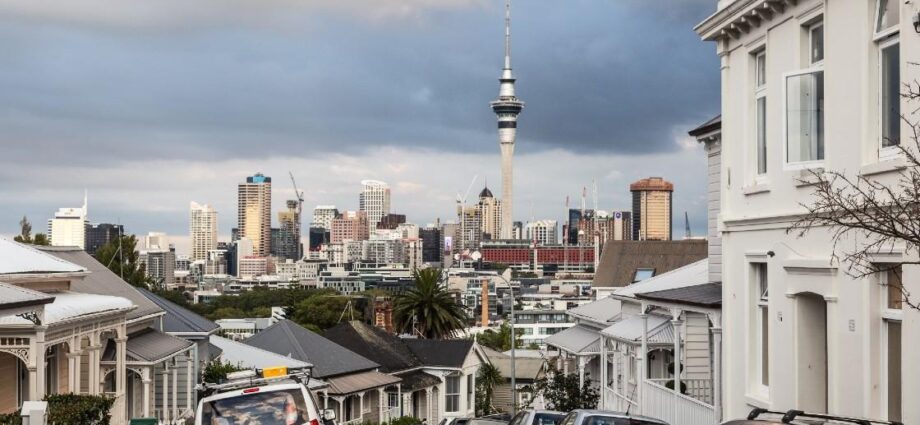PHOTO: New Zealand has experienced faster growth in house prices than any other OECD country. Photo credit: Getty Images
New Zealand’s “prohibitively expensive” housing market could have been prevented with successful congestion-mitigation policies and less restrictive planning rules, new research has found.
The New Zealand Infrastructure Commission’s new report looks at how prices and supply have changed over 90 years from the 1930s to the 2010s, to understand why New Zealand has experienced faster growth in house prices than any other OECD country.
Despite Auckland house prices dropping for the first time in two years over the last few months, the average price is still $1.55 million, according to the latest OneRoof-Valocity House Value Index.
Of course, there are several factors at play. House prices shot up by 30 percent in 2021, in part sparked by historically low interest rates imposed by the Reserve Bank at the start of COVID-19 to stimulate the economy. But lack of housing supply is an issue that goes back decades.
New Zealand was building at a rapid rate in the 1950s, 60s, and 70s, but it has declined continuously since then, according to Infrastructure Commission Economics Director Peter Nunns.
“Between 2010 and 2018, we built new homes at a slower rate than population growth, and prices accelerated. The research suggests that now, when housing demand increases, we build a quarter to a third less homes than we used to.”
Nuns pointed blame at changes to urban planning and transport that started in the 1970s, which raised barriers to housing development.
“Until the 1970s, city councils actively encouraged population growth both at the fringe of the cities and in established suburbs. Cars became more affordable and urban roads were paved and improved, allowing people to travel further, faster and boosting development of new suburbs.
“Council plans facilitated infill housing prior to the 1970s but started to limit it after that point. Planning began to focus less on facilitating growth and planning infrastructure, and more on maintaining the character of existing neighbourhoods by stopping the construction of blocks of flats and apartments.”
Another major barrier to city growth was traffic congestion, the research found.
Between 1950 and 1970, as cars became widespread and roads were improved, average travel speeds increased, allowing for more urban spread. But since the 1990s, average speeds have declined “due to rising traffic congestion and the lack of high-quality alternatives”.
The research found that travel speeds on nine arterial roads and motorways declined by an average of around 30 percent between 1986 and 2012 despite significant road widening.
“When urban planning policies limit development, either ‘up’ in the centre of the city or ‘out’ at the fringes, it leads to higher house prices and reduced supply over time,” the Te Waihanga researchers wrote.
“Planning rules became more restrictive and more complex over time. Central Auckland’s capacity for new housing was cut in half in the early 1970s – a change that was partially reversed in the 2016 Auckland Unitary Plan.
“When travel speeds change, it changes the attractiveness of different locations for housing development, which can open up more opportunities to build. Urban planning and transport facilitated housing prior to the 1970s, but subsequent changes have erected barriers to housing.”
The researchers concluded: “Our analysis shows that accelerating house prices were not inevitable. If we had not downzoned central Auckland in the 1970s, or if we had chosen to adopt successful congestion-mitigation policies, then housing would now be more abundant and house prices would be lower.”
Is there hope for New Zealand’s housing market?
The Te Waihanga researchers note that it’s “ironic” councils chose to limit urban intensification at the point at which changing transport speeds were about to make urban expansion harder.
READ MORE VIA NEWSHUB
MOST POPULAR
 Melissa Caddick’s parents and husband face being HOMELESS | AUSTRALIA
Melissa Caddick’s parents and husband face being HOMELESS | AUSTRALIA Simon Bridges’ Tauranga family home passed in at auction | WATCH
Simon Bridges’ Tauranga family home passed in at auction | WATCH Abandoned land for sale
Abandoned land for sale NZ winery billionaire whose private jet brought the body of Shane Warne back from Thailand
NZ winery billionaire whose private jet brought the body of Shane Warne back from Thailand ‘Unacceptable’: top real estate agents axed
‘Unacceptable’: top real estate agents axed Auckland development put up for mortgagee sale
Auckland development put up for mortgagee sale Fletcher Living, to develop Ellerslie Racecourse
Fletcher Living, to develop Ellerslie Racecourse Kiwis leaving New Zealand in droves – 20,000 to leave this year
Kiwis leaving New Zealand in droves – 20,000 to leave this year House price boom: Homes owned by Auckland politicians
House price boom: Homes owned by Auckland politicians HOUSING CRISIS: 80 percent of property investors are planning rent rises
HOUSING CRISIS: 80 percent of property investors are planning rent rises
















